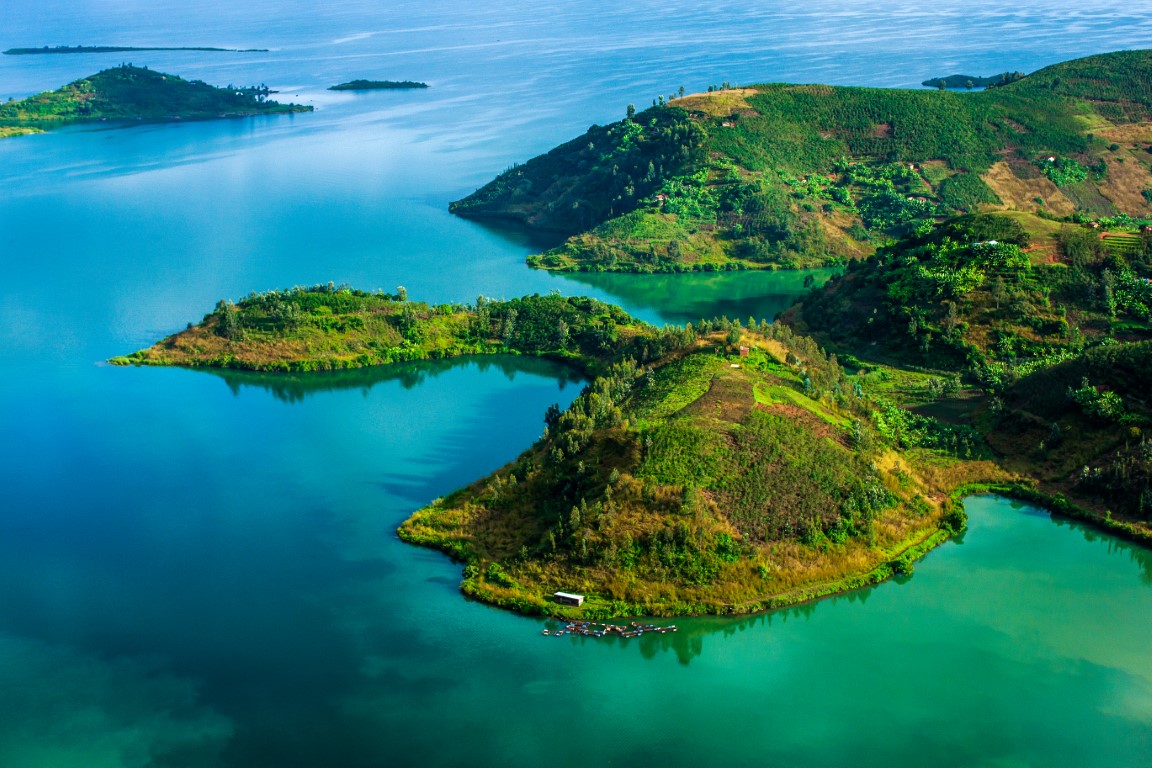Lake Kivu, Rwanda: An Exploration of Rwanda’s Jewel
Lake Kivu, nestled in the heart of East Africa, is one of Rwanda’s most breathtaking natural wonders. As the largest of Rwanda’s lakes and the sixth-largest in Africa, Lake Kivu spans an impressive 2,700 square kilometers. It is a vital component of Rwanda’s landscape, offering stunning scenery, vibrant local culture, and a plethora of recreational activities. With its serene waters set against the backdrop of lush hills and verdant forests, Lake Kivu is a perfect destination for those seeking both relaxation and adventure in Rwanda.
 Geography and Natural Beauty
Geography and Natural Beauty
Lake Kivu is situated on the border between Rwanda and the Democratic Republic of Congo (DRC). The lake is part of the Albertine Rift, a branch of the East African Rift System, and is surrounded by dramatic landscapes that include rolling hills, verdant forests, and picturesque fishing villages. The lake’s unique geographic location and volcanic origin contribute to its stunning beauty and ecological significance.
The clear blue waters of Lake Kivu are contrasted by the surrounding mountainous terrain, creating a dramatic and picturesque setting. The lake’s shoreline is dotted with charming villages and sandy beaches, while its islands offer secluded retreats for visitors. The backdrop of the Virunga Mountains adds an extra layer of allure, making Lake Kivu a visual masterpiece and a haven for nature lovers.
Recreational Activities
Lake Kivu offers a wide range of recreational activities, catering to both thrill-seekers and those seeking relaxation. One of the most popular activities is boat trips, which allow visitors to explore the lake’s serene waters and discover its various islands. Boat tours often include visits to scenic spots like Idjwi Island, the largest island in Lake Kivu, where visitors can experience local culture and enjoy stunning views.
For those interested in water sports, Lake Kivu provides excellent opportunities for kayaking, sailing, and paddle boarding. The calm and clear waters of the lake make it ideal for these activities, providing both excitement and tranquility. Additionally, fishing is a popular activity, with local fishermen offering guided tours and insights into traditional fishing techniques.
Cultural Experiences
The communities surrounding Lake Kivu are known for their vibrant cultures and traditions. Visitors to the lake have the opportunity to engage with local communities and experience their way of life. Traditional Rwandan dances, music performances, and craft markets offer insights into the rich cultural heritage of the region.
One of the highlights is the chance to visit local fishing villages, where visitors can observe traditional fishing practices and interact with fishermen. These villages provide a glimpse into daily life on the lake and offer opportunities to learn about the local economy and customs.
Environmental Significance
Lake Kivu is not only a beautiful destination but also an important ecological asset. The lake is a critical freshwater resource for the surrounding communities and plays a key role in the local ecosystem. Its unique features, including the presence of methane gas deposits, add to its ecological significance.
The lake’s methane reserves are of particular interest due to their potential for energy production. Researchers and environmentalists are exploring ways to harness this resource sustainably, which could contribute to energy needs while minimizing environmental impact. Conservation efforts are also in place to protect the lake’s water quality and surrounding habitats, ensuring that Lake Kivu remains a pristine and vital resource for future generations.
Tourism and Accommodation
Lake Kivu offers a variety of accommodation options to suit different preferences and budgets. From luxury lodges and boutique hotels to budget-friendly guesthouses and campsites, visitors have plenty of choices for a comfortable stay. Many of these accommodations are located along the lake’s shores, providing stunning views and easy access to recreational activities.
EcoQuest Safaris Ltd offers curated travel packages that include accommodation, guided tours, and activities around Lake Kivu. These packages are designed to provide a seamless and enriching experience, allowing visitors to fully enjoy the lake’s natural beauty and cultural attractions.
Conservation and Sustainability
Sustainable tourism is a key focus for the management of Lake Kivu and its surrounding areas. Efforts are being made to ensure that tourism activities are conducted in an environmentally responsible manner. This includes initiatives to reduce waste, protect natural habitats, and support local communities through community-based tourism projects.
Visitors are encouraged to engage in responsible tourism practices, such as minimizing their environmental footprint, respecting local customs, and supporting local businesses. By participating in sustainable tourism, visitors can contribute to the preservation of Lake Kivu’s natural and cultural heritage.
